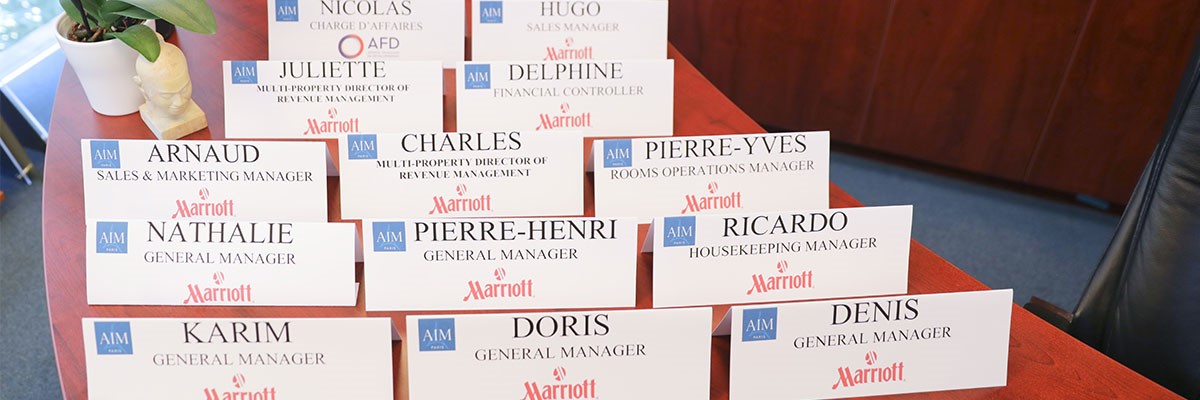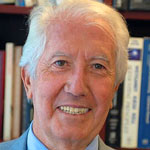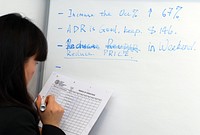Organisation des études sur 9 mois
 |
 |
 |
 |
Vacances d'hiver : 2 semaines selon le calendrier de l'Académie de Paris

Pré-requis : BAC +3 (Bachelor, Licence, Maîtrise, Masters en toutes disciplines) + 5 années d’expérience professionnelle au minimum.
Durée des études : 9 mois (début octobre –fin juin).
Cours dispensés en anglais
Début du programme : le 1er lundi du mois d’octobre.

Enregistrement renouvelé le 28 juin 2024 au RNCP (Niveau 7)
sous l’intitulé : Directeur d’établissement de luxe en hôtellerie internationale..

En proposant un programme complet, englobant divers aspects du management hôtelier, cette formation garantit que les participants sont bien préparés pour relever les défis du secteur hôtelier dynamique et compétitif.
En mettant l’accent sur l’application pratique et les scénarios du monde réel, nous offrons une opportunité unique aux professionnels de développer davantage leur expertise et de faire progresser leur carrière dans le domaine de l’hôtellerie internationale.
Sur une période de 9 mois (d’octobre au juin), les participants acquièrent et maîtrisent les compétences et connaissances managériales requises pour les postes de Direction, notamment dans l’hôtellerie du luxe.
Ils appliquent également ces techniques de à toute autre entreprise effectuant le management et la gestion des Ressources humaines, la Supervision d’équipes, la Comptabilité, la Finance, le Contrôle et Analyse des coûts, les Ventes et le Marketing, les Achats/ Approvisionnements, …
Nota bene :
Un enseignement unique, exclusif et concret. Depuis 1992, nous transmettons aux étudiants et aux professionnels :
- l’excellence du savoir-faire à la française en matière de luxe et de service, en collaboration avec les palaces parisiens et l’école de cuisine Ducasse - Paris Studio.
- l’excellence de l’art du management à l’international avec un programme professionnel :
Un contexte qui explique la grande facilité d’intégration dans ces établissements de nos diplômés, bénéficiaires de la version originale (en anglais) de ces formations dispensées par un corps enseignant hautement qualifié.
 |
Patrick ROSIER |
 |
 |
 |
 |


The program presents financial accounting concepts and shows how they apply to the hospitality industry. It incorporates the most recent formats, information, and schedules from the newly-published Uniform Systems of Accounts for the Lodging Industry.

This course presents basic financial accounting concepts and explains how they apply to the hospitality industry.
This course presents a systematic approach to human resources management in the hospitality industry. Students will analyze contemporary issues and practices, as well as employment laws that have an impact on the way people are managed.
[ TOPICS ]

 This course is designed to provide students with a solid background in hospitality sales and marketing. The main focus is on practical sales techniques for selling to targeted markets.
This course is designed to provide students with a solid background in hospitality sales and marketing. The main focus is on practical sales techniques for selling to targeted markets.
At the completion of this course, students should be able to:
The Certification in Hotel Industry Analytics (CHIA), in cooperation with AHLEI, is the leading certification for undergraduate and graduate students, as well as professors, in Hospitality and Tourism programs. This recognition provides evidence of a thorough knowledge of the foundational metrics, definitions, formulas and methodologies that are used by the hotel industry. Recipients have proven that they can “do the math” and interpret the results. They have demonstrated an ability to analyze various types of hotel industry data and to make strategic inferences based upon that analysis. Certification also confirms a comprehensive understanding of benchmarking and performance reports that are used by industry professionals. Recipients have a grasp of the current landscape of the hotel industry, including relevant current events. Achieving this distinction announces that these students have a place among the best graduates in their profession and opens the doors to future career opportunities. Qualifying students receive a certificate of accomplishment. Their names and schools are listed on the American Hotel & Lodging Educational Institute (AHLEI) website and they can use the CHIA designation on their resume/CV and business cards.
The certification is based upon four core content areas:

Students should already be familiar with financial accounting concepts and procedures,
This course presents managerial accounting concepts and explains how they apply to specific operations within the hospitality industry.
At the completion of this course, students should be able to:
This course describes how to develop and implement an effective purchasing program, focusing on issues pertaining to supplier relations and selection, negotiation, and evaluation. The course includes in-depth material regarding major categories of purchases.
[ TOPICS ]

Hospitality managers are charged with making strategic and proactive decisions to increase occupancy rates and total revenue for their properties.
Applying a systematic process to such decision-making can increase their success.
This certificate program in hotel revenue management, developed by renowned revenue management expert Dr. Sheryl Kimes of Cornell’s School of Hotel Administration, provides a holistic view
of the application of hotel revenue management concepts and practices to the hospitality industry.
The courses focus on several high-impact drivers for maximizing revenue: forecasting and availability controls, pricing and distribution channel management, overbooking and group management, and non-traditional revenue management applications. Each course explores a topic in depth, with particular emphasis on the role of strategy in effective revenue management and the practical application of tools and techniques in the hospitality setting.
Implementing a revenue management strategy can be one of the most important revenue-generating initiatives available to a hotel, significantly increasing room revenue and profits. This course provides an overview of revenue management applications to the hotel industry designed to inspire a strategic shift to managing revenue per available room (RevPAR).
Revenue management is a systematic process designed to increase revenue by selling the right room to the right person at the right time for the right price. In addition to evaluating different pricing models and applying duration-management strategies, this course provides a foundation for more advanced revenue management courses in forecasting, group management and overbooking, pricing strategy, and application of revenue management techniques to other hospitality-related industries including spas and athletic facilities.
Participants who complete this course will be able to:
All successful revenue management strategies are based on the ability to forecast demand accurately and control room availability and length of stay.
This course explores the role of the forecast in a comprehensive revenue management strategy, including the selection of the best type of forecast and the impact of forecasting on other functions such as labor scheduling and purchasing. It presents a step-by-step approach to the mechanics of creating an accurate forecast. Participants learn how to build booking curves; account for “pick-up”; segment demand by market, group, and channel; and calculate error and account for its impact. The course also explores the impact of availability controls, including length-of-stay management, on revenue management and how they can be leveraged.
Participants use Microsoft Excel to practice forecasting and availability control techniques.
Participants who complete this course will be able to:
Pricing is one of the most powerful tools a hotel can use to increase revenue. This course teaches you how to set the right prices, develop rate fences (differentiate prices by customer type), and use multiple distribution channels to manage price more effectively. You’ll learn about the impact of variable pricing and discounting on revenue management in the context of price elasticity, optimal price mix, perceived fairness, and congruence with positioning and sales strategies.
Channel management is an essential tool for controlling differentiated pricing, maintaining rate fences, and increasing revenue. You’ll explore various approaches to managing distribution channels including direct sales, agencies, the Internet, and opaque pricing channels.
Finally, discussions of best practices and industry case studies help you extend and contextualize your learning experience.
Participants use Microsoft Excel to practice pricing and distribution-channel-management techniques.
Participants who complete this course will be able to:
Businesses that accept reservations must cope with the problem of no-shows: customers who make a reservation but fail to honor it. Hotels can protect themselves against revenue lost from no-shows and generate increased revenue by overbooking. This course teaches you how to strategically overbook and how to manage issues associated with overbooking, as well as how to evaluate groups and determine which rates to charge.
This course explores the components of a successful overbooking strategy including no-show forecasting, no-show rates, arrival uncertainty, pricing policies, and cancellation forecasts. It explores the risks of overbooking and presents strategies to minimize costs and mitigate customer impact.
To fully realize your property’s revenue potential, you must be able to manage group reservations. This course teaches you how to create a group forecast and explores yieldable and non-yieldable business and incremental group costs and revenue opportunities. It introduces models to calculate displacement costs and contribution margins to determine which groups are most profitable.
Participants who complete this course will be able to:
Revenue management can be applied to any industry with relatively fixed capacity, time-variable demand, and perishable inventory. This course teaches you how to apply revenue management concepts and practices to hospitality-related industries such as restaurants, meeting spaces, spas, and golf facilities. You’ll learn a step-by-step process to develop, implement, and monitor a revenue management strategy to maximize top-line revenue.
Participants who complete this course will be able to:

Students learn:
Includes the analysis and interpretation of financial information to make better-informed decisions. This understanding includes reviewing concepts and tools such as:
Emphasis is placed on the fact that accounting is not just numbers, but rather a powerful tool to better manage people, performance, and profit.
The Finance segment focuses primarily on issues below Gross Operating Profit (GOP). This includes a discussion of the impact of the owner’s decisions on the hotel’s performance including financial leverage. The analysis concentrates on the economic assessment from the owner’s perspective and presents a clearer understanding of owner’s measures of success and investment criteria including:

A comprehensive training program on hotel and tourism research.
Participants demonstrate step-by-step analytical skills, observe a range of case scenarios and then apply what they have learned to complete their own comprehensive research project.
The training can be personalized related to a geographic area, type of research or related to specific needs.
The program includes five modules:

Strategic and Marketing approaches that proved successful in the past may not apply to our new hospitality world: customers’ needs evolve constantly and organizations have to identify “blue oceans” of new demands to generate revenue, profit and growth.
For the Marketing and Entrepreneurial Development course, students are organized in small groups and are confronted with 3 challenges:
- A Creative Challenge by Identifying a profitable New Product Idea, around the Hospitality and Tourism world .
- A Business Challenge by Writing up a full Business Plan from the market need identification to the competitive environment, up to the recommended strategy and all product tactics necessary to achieve the chosen objective. A 3 year P&L projection completes the exercise.
- A Self-assertiveness Challenge by Pitching their group Business Plan in front of a Jury to confirm their ability to present convincingly and answer questions from “could be” Business Angels : thus, a complete preparation to future professional presentations.

N.B. : L'organisation de certains cours de management peut être modifiée en fonction du calendrier de certains "visiting professors".
Tous les ans, nos vaillants étudiants en MSc sont soumis aux dures épreuves de Koezio, parc d’aventure en équipe, mêlant défis physiques et intellectuels.
Les participants, tout en mettant en valeur leur cohésion en équipe, confirment ainsi leur motivation et leur capacité à allier réflexion et action en situation d’urgence.
Un bon exercice pour mettre en exergue leurs atouts et leurs qualités qui seront sollicités tout au long de leur cursus à l'AIM et de leur carrière.

Des travaux d’équipes pour des projets concrets, avec des planifications rigoureuses
nécessitant des connaissances approfondies, toutes dispensées durant le programme.
Grâce à la carte d'accès à la Bibliothèque de la CIUP offerte par l'AIM, les étudiants ont la possibilité de se perfectionner dans la langue étrangère de leur choix parmi un catalogue de plus de 26 langues.
 Au sein du campus de la Cité Internationale Universitaire de Paris, l'Espace langues accueille les étudiants de l'AIM du lundi au vendredi et leur garantit d'excellentes conditions d'apprentissage des langues étrangères : langue générale, langue des affaires, grammaire, expression et compréhension écrite et orale, prononciation et perfectionnement.
Au sein du campus de la Cité Internationale Universitaire de Paris, l'Espace langues accueille les étudiants de l'AIM du lundi au vendredi et leur garantit d'excellentes conditions d'apprentissage des langues étrangères : langue générale, langue des affaires, grammaire, expression et compréhension écrite et orale, prononciation et perfectionnement.
Sont essentiellement dispensés par l'Espace langues :
français
anglais
espagnol
italien
portugais
turc
arabe
hébreu
chinois
farsi
ourdou
néerlandais
japonais
coréen
arménien
hindi
russe
grec
L'AIM bénéficie d'un partenariat avec l'association américaine AHLEI attestant que les formations dispensées à l'AIM répondent aux plus hauts standards internationaux en matière d’enseignement supérieur.
Particulièrement destinées aux professionnels en exercice afin d'élargir leurs connaissances, elles permettent à nos étudiants d'accéder rapidement aux emplois au niveau international selon leur profil.
L’AHLEI fait autorité dans le monde entier en matière de conseil et de mise en place des meilleurs outils de gestion dans les plus grandes chaînes hôtelières internationales.
Pour n’en citer qu’un, le Uniform System of Accounts for Hotels, plan comptable de l’industrie hôtelière qu'il a conçu et édité, est utilisé par tous les grands établissements, aussi bien en France qu’au niveau international.

 Formations d’excellence à l’Art Culinaire (optionnelles)
Formations d’excellence à l’Art Culinaire (optionnelles)